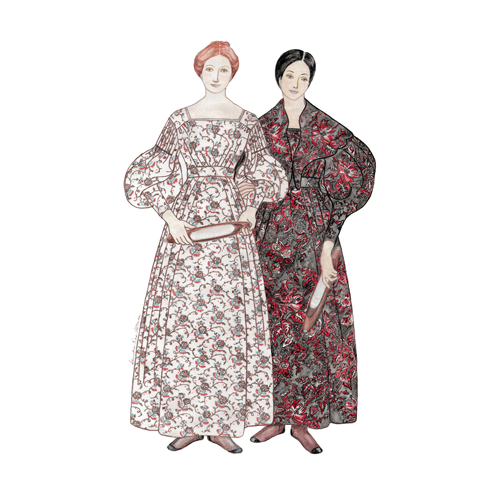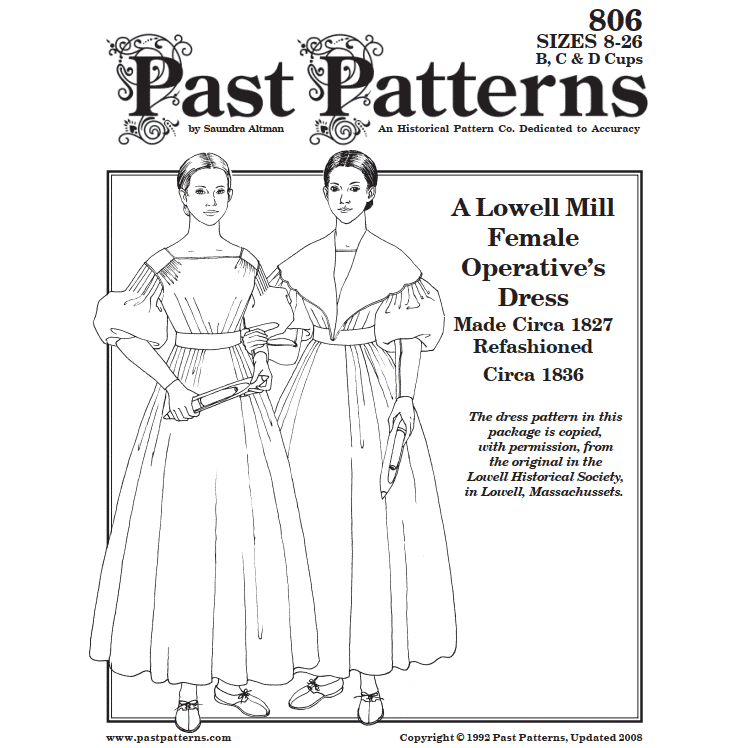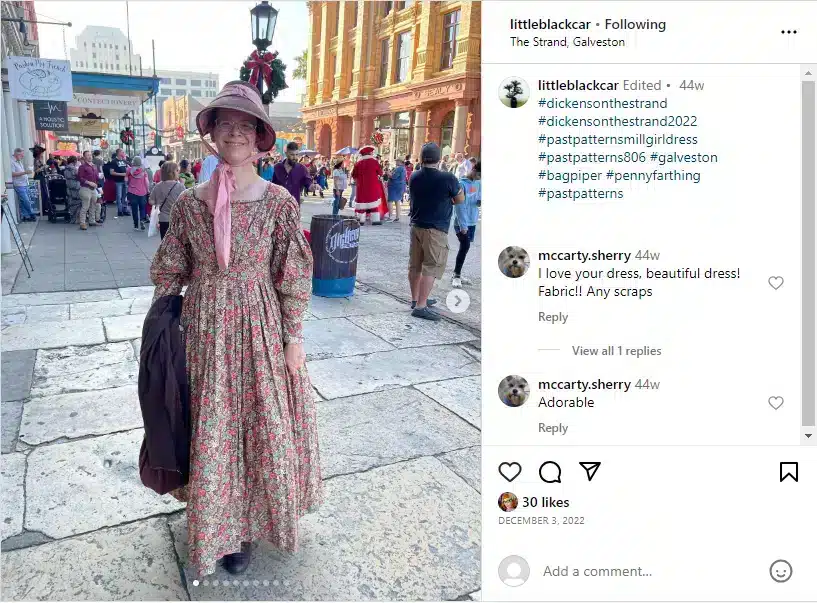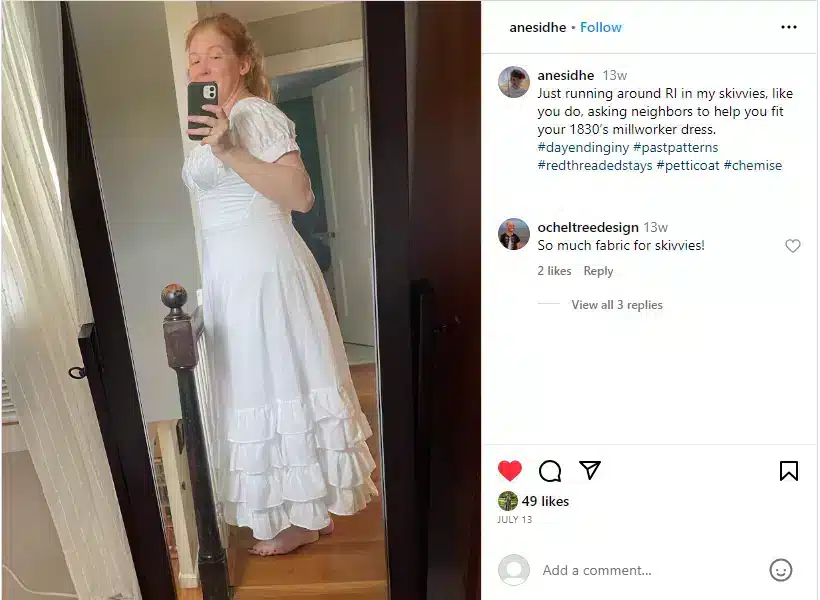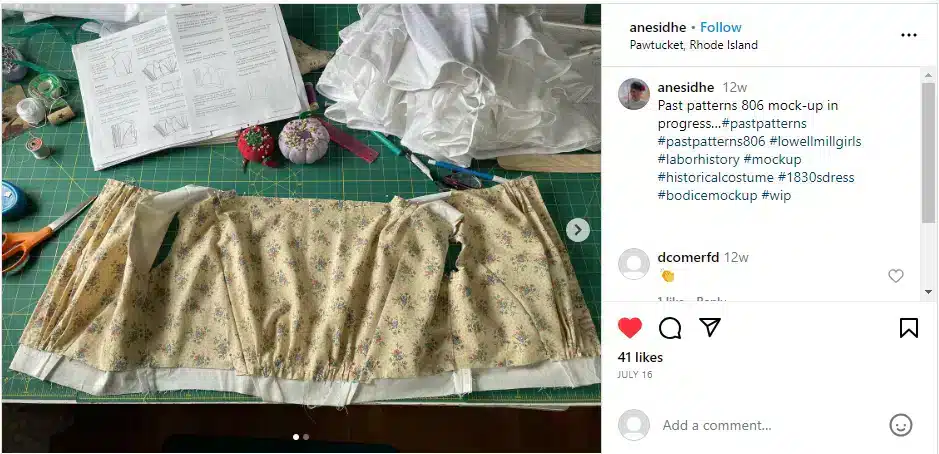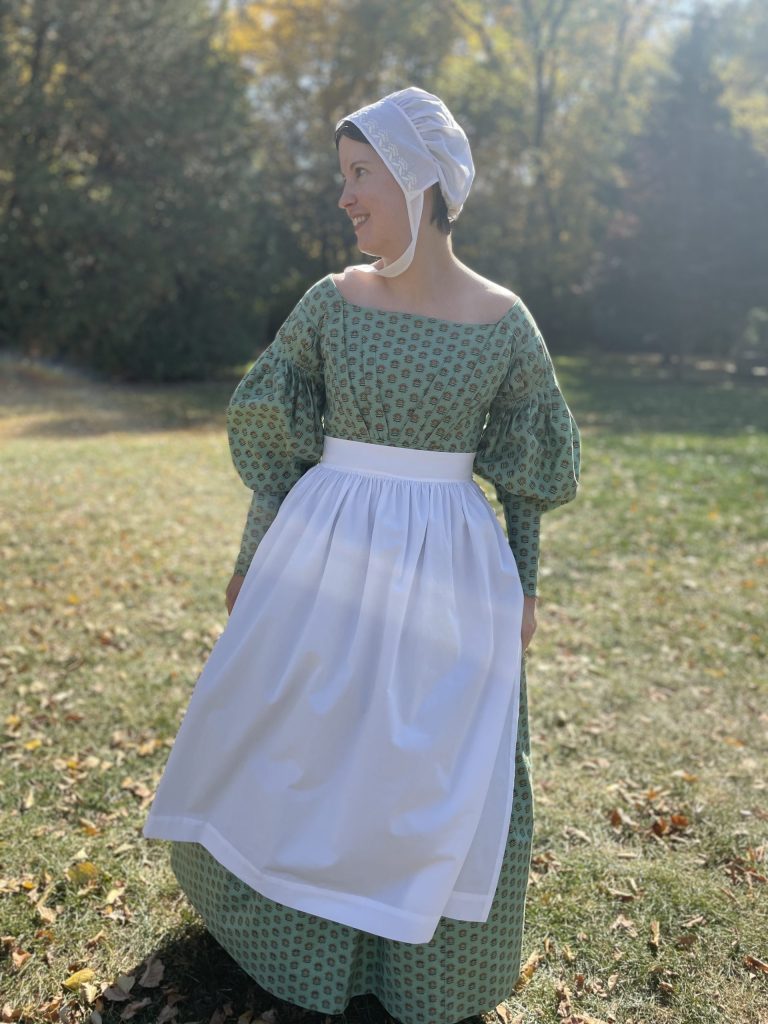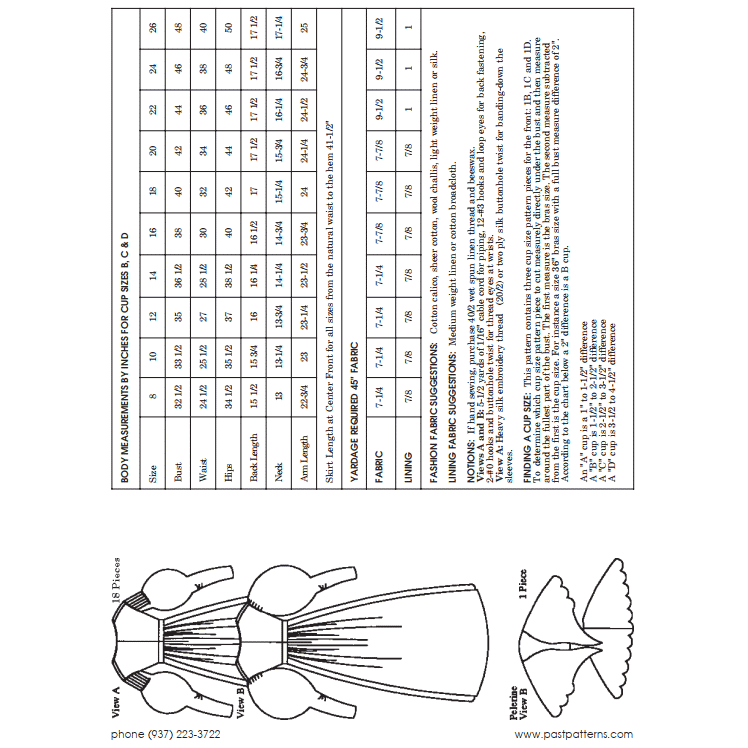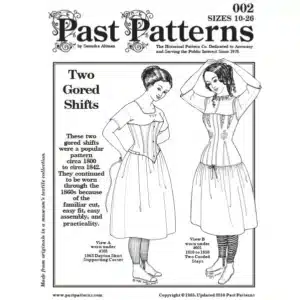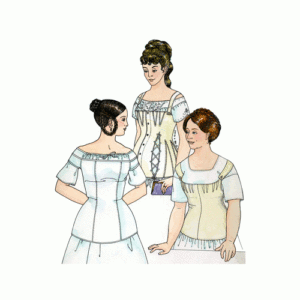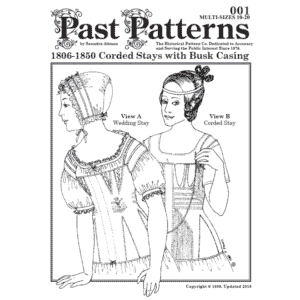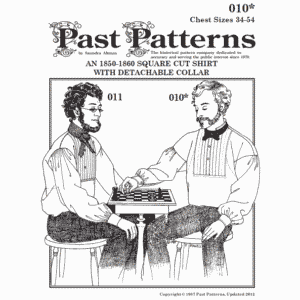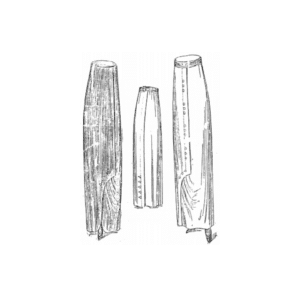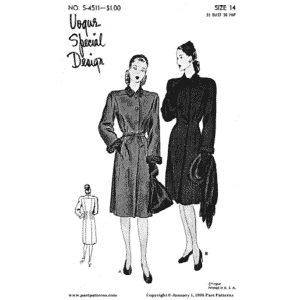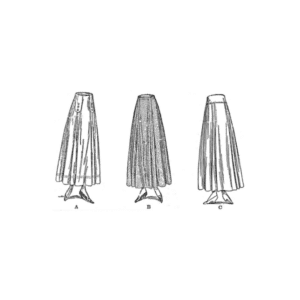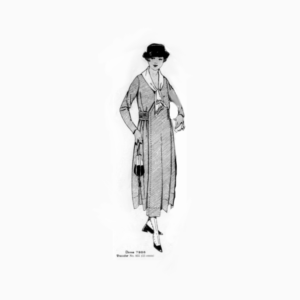1820s Lowell Mill Dress Sewing Pattern | Past Patterns 0806
$39.00
Authentic 1820s Lowell Mill Dress printed sewing pattern based on a garment worn by an actual textile worker. Features historically accurate construction, two sleeve styles (1827-1840), and Sizes 8-26 with B, C & D cup options. Includes 5 sheets of pattern pieces with illustrated instructions.
990 in stock
Get Free Shipping
On all US Orders over $50!
$39.00
Authentic 1820s Lowell Mill Dress printed sewing pattern based on a garment worn by an actual textile worker. Features historically accurate construction, two sleeve styles (1827-1840), and Sizes 8-26 with B, C & D cup options. Includes 5 sheets of pattern pieces with illustrated instructions.
990 in stock
Get Free Shipping
On all US Orders over $50!
All of our patterns tell a story.
Why Choose This Pattern?
Authentic 1820s Lowell Mill Dress Sewing Pattern - Recreate American Industrial Revolution Women's Workwear
This 1820s Lowell Mill Dress Sewing Pattern is an original Past Patterns design, meticulously researched and based on a dress worn by Mary Gregg Butler, a textile worker from Lowell, Massachusetts. Experience historical accuracy combined with modern pattern-making techniques in this exceptional reproduction.
The dress captured in this 1820s Lowell Mill Dress Sewing Pattern represents the distinctive transition from Regency to early Victorian styles that defined women's working attire during America's Industrial Revolution. This pattern includes both sleeve variations found on the original garment, allowing you to create historically accurate interpretations for multiple periods.
Historical Background of the Lowell Mill Dress
According to family records, the dress documented in our 1820s Lowell Mill Dress Sewing Pattern was originally made in the late 1820s or early 1830s with full leg o'mutton sleeves. After this style fell from favor around 1836, the sleeves were modified to the banded-down style seen in many period illustrations. The included pelerine capelet was worn with the full-sleeved version, providing both warmth and fashionable detail to the ensemble.
The women who wore these dresses were pioneers in American labor history. Young women from farming communities traveled to Lowell to work in textile mills, gaining unprecedented financial independence and forming some of the first labor organizing efforts in American history. Their story represents a critical chapter in women's history, industrial development, and the changing social fabric of early America.
Period-Accurate Construction Details
The 1820s Lowell Mill Dress Sewing Pattern features authentic construction techniques, including:
- Distinctive "V" shaped gathering at the bodice front
- Period-correct bodice piping techniques
- Historically accurate sleeve construction for both variations
- Proper skirt fullness and hem proportions
- Optional pelerine construction with scalloped edges
Each detail has been carefully documented from surviving garments and period illustrations to ensure your finished dress accurately represents what women wore during this pivotal historical period.
Pattern Features
- Historically accurate construction techniques based on extant garments
- Two authentic sleeve options: full leg o'mutton (1827-1835) and banded-down (1836-1840)
- Optional pelerine capelet pattern piece
- Comprehensive sizing for modern figures while maintaining period silhouette
- Detailed historical background information included with pattern
- Step-by-step illustrated sewing instructions for all construction stages
Sizing for Your Historical Dress
Our 1820s Lowell Mill Dress Sewing Pattern is professionally graded for Sizes 8-26 with B, C, or D cup options to accommodate a wide range of measurements:
- Bust: 32½" - 48"
- Waist: 24½" - 40"
- Hip: 34½" - 50"
This inclusive sizing ensures that historical costumers of many body types can accurately recreate this important garment while maintaining the authentic silhouette of the period.
Fabric Recommendations
The original dress with the banded-down sleeves was made from a fine white cotton print with red, blue, and brown flowers, leaves, and vines. The full-sleeved version featured a large poinsettia with morning trumpet flowers and large broad leaves.
For historical accuracy, we recommend cotton calico prints, fine cotton, linen, or lightweight wool - all fabrics that would have been available and appropriate for working women's dresses in the 1820s-1840s period.
This historical pattern requires:
- Sizes 8-14: 7¼ yards of 45" wide fabric
- Sizes 16-20: 7¾ yards of 45" wide fabric
- Sizes 22-26: 9½ yards of 45" wide fabric
Educational Value
Beyond being a sewing pattern, this 1820s Lowell Mill Dress Sewing Pattern package serves as an educational resource about an important period in American history. The extensive documentation included provides valuable insights into the lives of early industrial workers, the development of American textile manufacturing, and women's roles in the changing economy of the early 19th century.
Community Resources
Join the community of historical costumers making garments from this pattern:
- Read discussions about this pattern on Reddit's Historical Costuming community
- Follow a detailed construction walkthrough on The Fabric of Time blog
Complete Pattern Package
Your 1820s Lowell Mill Dress Sewing Pattern package includes:
- 5 CAD/CAM-created sheets of pattern pieces, professionally drafted and tested
- Illustrated and written construction directions with clear step-by-step guidance
- Extensive historical information about Lowell mill workers and their significance
- All printed on 20 lb. white paper and packaged in a durable, reusable plastic sleeve
We always offer reasonable shipping rates for domestic and international orders, with automatic adjustments for multi-item purchases to ensure the best value for our customers worldwide.
Prefer a digital version? Find our 1820s Lowell Mill Dress downloadable pattern here.
Past Patterns: Preserving historical accuracy since 1979.
Additional information
| Weight | 23 oz |
|---|---|
| Dimensions | 13 × 10 × 3 in |
This item is for single, non-commerical usage. If you want to mass produce items, please contact us.
Sizing Information
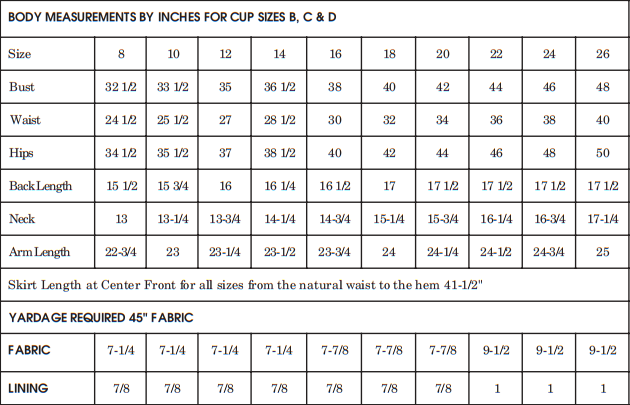
(Metric size sheet opens as a PDF in a new browser tab)
Preferred Vendors
Past Patterns works with vendors from all over the world to help us replicate the amazing articles of clothing. Now you can too!
Visit our preferred vendors page to order directly from some of our top recommended suppliers.
FAQ's
(Frequently asked questions)
Why are both Trowsers and Trousers listed on site?
Over the last 200 years, much like the human body, our style of language has changed. For vintage patterns, we attempt to use the language of the day where possible.
Can you grade (edit) a Vintage Revival pattern for my size?
please contact us with the specific pattern number and the specifications you require. We have staff available for this for an additional fee.
What sizes do Past Patterns patterns come in?
Our patterns, with some exceptions, are manufactured in sizes 8 through 26 for women and sizes 34 through 54 for men. Most patterns are multi-sized. For a complete listing of measurements in inches see the size chart.
Do you have vintage patterns (manufactured prior to 1950) that you want to sell?
we are always on the lookout for original, American designed, vintage patterns especially for categories outside of current items. We are interested if you have 1 pattern or 1000 patterns. Give us a call to discuss.
Why is my pattern size different from my off the rack dress size?
We use the U. S. Board of Standard Measurements to size our patterns. The ready made clothing manufacturers have their own set of sizes developed from their own statistics. For a complete listing of measurements in inches see the size chart.
How are the patterns packaged?
We package our patterns in two forms: Bond Paper and Tissue. Except for the Tissue patterns, each is slipped into a reusable plastic sleeve. Many contain documentation in the form of Historical Notes or the printer ie., Butterick. Because the patterns are printed in house to order, they can take from three to seven days. Tissue patterns, which are printed out of house, are available to ship immediately.
What does a Corset Kit contain in addition to the Corset pattern?
In addition to the pattern, the kits contain everything you need to make the corset except the thread. The kits contain, according to their type, fabric and lining, stays, clasp or busk board, back lacing, tape for finishing the edges, trim lace, ribbon, leather, tin stock, waist tape, punch and setter, eyelets, marking pencils, cording, reed and a loop turner.
Need a pattern in your language?
we can translate our instructions into just about any language
Have an old and incomplete Past Patterns item. What can I do?
The answer depends on if the pattern is still in production or not. If it is, please mail us the old pattern and we will ship you a copy of the latest pattern for a minimal fee along with normal shipping charges. If the item is no longer in production, we would need to know exactly what you have to determine the best course of action to help you.
What is the difference between a Past Patterns original pattern and a Vintage Revival pattern?
The Past Patterns originals were designed in house and based upon the research, disassembly and time of Saundra Ros Altman. These designs come from finds all over the United States reaching from San Diego, California to the Smithsonian Museum in Washington, DC. She created the initial patterns, the sizing charts and the instruction content. Many of the these patterns are multi-sized or are available in various sizes. For the most part, these designs are done taking into account the modern human body's shape, height and weight. The Vintage Revival patterns are traces or copies of an old, mass produced pattern; the first mass produced patterns came out in the 1850s. For the most part, you get exactly what came in the original package; in some cases, Saundra has appended historical notes to the instructions. The Vintage Revivals patterns, being copies of the originals, generally only come in one size and are based upon the size and shape of the human body from the era the pattern came from.
What software do you use to create patterns?
We utilize PW Studio for our designs. Isabelle Lott, a contributor over the years to Past Patterns, is the owner of the company and will be happy to answer an software related questions you have. Her software is available for licensing.
What measurements do I need to know to order a Corset Kit?
The bust and back length. The back length is measured from the prominent bone at the base of the neck to the natural waistline.
Where can I see the appropriate clothing fabrics for the 18th and 19th centuries?
You can see 1740 through 1940 fabrics in a book titled "Textile Designs" by Susan Meller and Joost Elffers. The subtitle states, "Two Hundred Years of European and American Patterns for Printed Fabric by Motif, Style, Color, Layout and Period and 1,823 Illustration in Color." What they don't say is that 90% of the swatches pictured are life size. The ISBN is 0-8109-3853-7. A second book is Wearable Prints, 1740-1860, History, Materials, and Mechanics by Susan W. Greene. The ISBN is 978-1-60635-124-6. Great books! Order it from your local library that has interlibrary loan capability if you cannot afford the price. There are now many sources for appropriate fabric through the Internet.
Where can I find antique patterns to purchase?
On the Internet try: "Patterns from the Past."
Need a pattern tomorrow?
we do offer expedited domestic shipping for extra fees. We can also expeditie international shipments but delivery dates overseas cannot be promised.
Becoming a Wholesalers of our patterns
We offer Wholesalers significant discounts that will allow both your and our businesses to flourish.
Why don't we sell PDFs of our patterns - First due to piracy. We have spent over 40 years creating and tracing these patterns along with researching them. We print and ship all of our patterns ourselves. If we started sending out PDFs, in no time, copies of our Intellectual Property would be all over the internet and we would be out of business. Second, some of our patterns are constantly being updated. We want our clients to get the BEST POSSIBLE version of our products.

